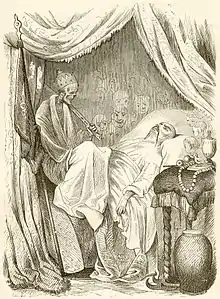The Nightingale (fairy tale)
"The Nightingale" (Danish: Nattergale) is a literary fairy tale written by Danish author Hans Christian Andersen. Set in ancient China, the story recounts the friendship between the Emperor and a nightingale.
| "The Nightingale" | |
|---|---|
| Short story by Hans Christian Andersen | |
 Illustration by Vilhelm Pedersen | |
| Original title | Nattergalen |
| Country | Denmark |
| Language | Danish |
| Genre(s) | Literary fairy tale |
| Publication | |
| Published in | New Fairy Tales. First Volume. First Collection (Nye Eventyr. Første Bind. Første Samling) |
| Publication type | Fairy tale collection |
| Publisher | C.A. Reitzel |
| Publication date | 1843 |
Plot
In the gardens of the emperor of China lived a nightingale whose song was more beautiful than the palace itself and was storied all over the world. When the emperor received a book from the emperor of Japan he was astonished to read about the nightingale, because he had never heard of it, nor had anyone in his court. He commanded that the nightingale be brought before him to sing. With the help of a poor kitchen girl, the nightingale was found and brought to the emperor, where he sang so beautifully that the emperor was moved to tears and made him a guest at court.
Soon after, the emperor received a new gift: a jeweled nightingale automaton that also sang. This nightingale's song was pretty, but always the same. The real nightingale, no longer appreciated, flew out of the palace while no one was looking. The emperor placed the artificial nightingale at his bedside and banished the real nightingale for his desertion. The artificial bird sang the emperor to sleep each night until its cogs wore down. The bird was repaired, but it could be played only once a year.
Five years later the emperor fell ill, and one night Death sat on his chest showing him the deeds of his past. The emperor wished for the artificial nightingale to sing away the unpleasant memories, but it was silent. Then a song erupted through the window, where the real nightingale was perched. The song restored the emperor's health and persuaded Death to leave him in peace. The nightingale declined to become a guest in the palace again, but offered to come when he would and sing about all that he had seen in the kingdom, if the emperor agreed to keep this a secret between them.
Gallery
 How common it looks, said the chamberlain[1]
How common it looks, said the chamberlain[1] The ladies took some water into their mouths to try and make the same gurgling, thinking so to equal the nightingale.[1]
The ladies took some water into their mouths to try and make the same gurgling, thinking so to equal the nightingale.[1] The music-master wrote five-and-twenty volumes about the artificial bird.[1]
The music-master wrote five-and-twenty volumes about the artificial bird.[1] Even Death himself listened to the song and said, 'Go on, little nightingale, go on!'[1]
Even Death himself listened to the song and said, 'Go on, little nightingale, go on!'[1]
Notes
- Andersen, Hans Christian. The Nightingale. Stories from Hans Christian Andersen. London: Hodder & Stoughton. 1910.
References
- Andersen, Hans Christian; Conroy, Patricia L. (transl.); Rossel, Sven H. (trans.) (1980). Tales and Stories by Hans Christian Andersen. Seattle: University of Washington Press.
- Andersen, Hans Christian; Frank, Jeffrey; Frank, Diana Crone (2003). The Stories of Hans Christian Andersen: A New Translation from the Danish. New York: Houghton Mifflin.
- Heiner, Heidi Anne (7 July 2007). "History of "The Nightingale"". SurLaLune. Retrieved 5 February 2009. link dead June 2023
- Jensen, Lars Bo. "Criticism of Hans Christian Andersen". Retrieved 5 February 2009.
- Johansen, Bertil Palmar; Haugan, Asbjørg (1987). "Keiseren og nattergalen". Archived from the original on 23 July 2011.
- Jorgensen, Cecilia (17 March 2005). "Did the Emperor Suffer from Tuberculosis?". Icons of Europe. Retrieved 5 February 2009.
- Petri Liukkonen. "Hans Christian Andersen". Books and Writers.
- Nunnally, Tiina (2005). Fairy Tales. Viking Penguin. ISBN 0-670-03377-4.
- "The Nightingale: Editions". Hans Christian Andersen Center. Retrieved 5 February 2009.
- Tatar, Maria (2008). The Annotated Hans Christian Andersen. New York and London: W.W. Norton & Company. ISBN 978-0-393-06081-2.
- Burton, Marianne (2013) She Inserts the Key. Seren is the book imprint of Poetry Wales Press Ltd, Bridgend. www.serenbooks.com
External links
- "Nattergalen": Original Danish text
 The full text of The Nightingale (Andersen) at Wikisource
The full text of The Nightingale (Andersen) at Wikisource- "The Nightingale": English translation by Jean Hersholt
- "Did the emperor suffer from tuberculosis?", essay of 17 March 2005 researched and written by Cecilia Jorgensen for World Tuberculosis Day.
 The Nightingale public domain audiobook at LibriVox
The Nightingale public domain audiobook at LibriVox